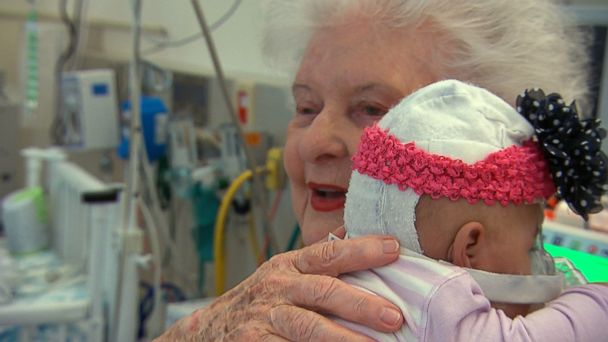Cuddling Babies: Hospital Volunteers Show the Power of Human Touch
ABC News' David Wright and Sarah Netter report:
The neonatal intensive care unit is full of buzzers, bells and the steady hum of technology. The machines that line the rooms are safeguarding the most fragile human lives. Lives like baby Oliver and his twin sister, Skye, who were born three months premature.
How reassuring, then, is the sound of a friendly voice? The look of a friendly face? Babies in the neonatal intensive care unit cling to moments like that, but sometimes parents and nurses can't be there to offer the constant reassurance.
That's where Pat Rice comes in. He is a volunteer " cuddler" at the Lucile Packard Children's Hospital Stanford.
Watch: The power of the cuddle hormone.
He and his wife, Claire Fitzgerald, have been cuddling babies there for 16 years, including Oliver and Skye. His deep voice helps soothe the babies. He joked someone once told him it sounded like a tuba.

ABC News
"Apparently the voice helps make a difference. I don't know why," said Rice. "But I find that it works pretty well."
The nurses said that the cuddles have an immediate impact for these infants. It can even be measured. Their blood oxygenation starts to climb, meaning the baby is relaxed and is breathing deeper.
The doctors say cuddling leads to better tolerance of pain, more stable body temperature and even stronger vital signs.
Asked whether he believes that a hug sometimes can be the best medicine, Dr. Ronald Cohen, the medical director of the intermediate care nursery at Lucile Packard Children's Hospital, said: "Absolutely."
"I'm sure if you remember back to your own childhood there were plenty of dents dings scrapes and bruises for which you found out mom's hug was the best medicine," Cohen said.
Oliver and Skye's parents, David and Seyi McLelland, agree.
"Obviously holding them is a really big deal. And I don't get the chance to be here as often as I'd like, so it kind of cuts the guilt factor for me quite a bit," said David McLelland.
"You can't be here 24 hours a day," Seyi McLelland said. "And it's very comforting knowing that while you're not here there's someone holding your child. And genuinely loving your child."
"Yes, I'm taking all the cuddlers home I keep telling them," Seyi McLelland said. "They're coming home with me."
Claire Fitzgerald can empathize. She had a sick baby herself, who is now all grown up with kids of his own.
"You know these people are scared to death," Fitzgerald told ABC News.
Fitzgerald and Rice said they often comfort parents whose babies are admitted to the NICU because they can share stories about all the babies they have cuddled who are now home and thriving.
Rice said that at his granddaughter's soccer game recently, a little girl came up to him and gave him a big hug - it was a child he had once cuddled in the hospital.
But being a NICU cuddler is not always easy. A few weeks ago, Fitzgerald turned up for her cuddling shift to find an empty cot.
"I've done this a long time, but the tears just rolled from my eyes. It's just hard to see one go," said Fitzgerald.
Most of the babies at the Lucile Packard Children's Hospital make it thanks to intensive medical intervention and the miracle of the human touch.